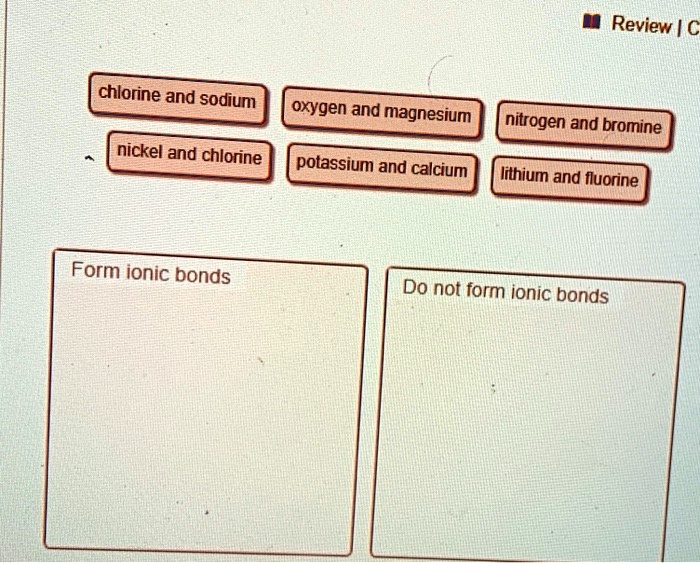Why Can't an Ionic Bond Form Between Potassium and Magnesium
Molybdenum actually has six valence electrons five in the 4d orbital and one in the 5s orbital. The slightly longer answer is they cannot form an antic bond because they both want to lose electrons to form a positive ion and to positive ions will not be attracted to each other.

Solved Chlorine And Sodium Oxygen And Magnesium Nitrogen And Bromine Nickel And Chlorine Potassium And Calcium Lithium And Fluorine Form Ionic Bonds Do Not Form Ionic Bonds Review
Regardless you are following the Octet Rule which is a simplification that only applies to the main group elements essentially the first two.

. A magnesium and potassium b fluoride and chloride c nitrogen and rubidium d chlorine and xenon Explanation. A magnesium and potassium b fluoride and chloride c nitrogen and rubidium d chlorine and xenon Explanation. Potassium will form a 1 ion and magnesium will form a 2 ion.
Thus krypton and lithium will most likely to. Why cant an ionic bond form between potassium and magnesiums. Highly Recommended - Top Tutors for All Subjects at All Levels here.
Potassium will form a 1 ion and magnesium will form a 2 ion. Both elements are metals so react by losing electrons. Also there is nothing available to accept the electrons lost.
Magnesium falls up under the second room. Magnesium can only form metallic bonds which are metal with metal and ionic bonds which are formed between metals. And since its a metal its gonna have the tendency to want to give away that one barren Solectron.
Magnesium and potassium are metals while chlorine and sulfur are nonmetals. The two elements will create an ionic bond MgI2. Chlorine has two in the 3s and five in the 3p.
Ions with opposite charges will attract one another creating an ionic bond. These arent oppositely charged therefore cant form an ionic bond. There must be a metal and a nonmetal present in the pair for an ionic compound to be formed.
The difference in charge between the two 1 potassium ions and the 2- sulfur ion allows electrostatic attraction between the sulfur ions and potassium ions. When potassium reacts with chlorine to form potassium chloride there is a transfer of electrons that creates two charged ions forming an ionic bond and a new compound. Why cant an ionic bond form between potassium and magnesium.
2 question 7 An ionic bond could form between. As a result of this exothermic reaction magnesium gives two electrons to oxygen forming powdery magnesium oxide MgO. HttpsspirescofranklychemistryThis short flash animation looks briefly at how the io.
The elements in this group are gonna have only one valence electrons. And once it does that its gonna want to become it head on and form a positive charge. This is an ionic bond and is the basis of the ionic compound formed as the differently charged ions are held together by their opposite charges.
There is an ionic bond between potassium and iodine. Answer 1 of 3. What kind of compound is magnesium and fluorine.
Potassium will form a 1 ion and magnesium will form a 2 ion. Krypton and lithium will most likely to form an ionic bond. Potassium and magnesium are both metals so it forms a metallic bond.
For a single bond it is possible to define an ionic bond when the electronegativity difference between the two atoms of the bond is greater than 20. Right from the general names of the groups it can be understood that both Na and Mg. Na and Mg are metals belonging to the Group 1 alkali metals and Group 2 alkaline earth metals respectively of the Long Periodic Table.
An ionic bond can be formed after two or more atoms loss or gain electrons to form an ion. This active transport mechanism involves magnesium. Potassium has one valence electron.
Why cant an ionic bond form between potassium and magnesium. Starting off with potassium potassium Theres a group one alkali metal. When Magnesium and Iodine are combined with some water a violet vapor is produced.
Elements with one two or three valence electrons tend to lose them to form positively charged ions. An ionic bond is formed when a metal and nonmetal bond. So short answer is they cant form an ionic compound because theyre both metals and ionic compounds are composed of one medal in one not metal.
3 iodine ions 0 Li3N 3 lithium ions 1 1 nitrogen ion 3. Magnesium burns so bright because the reaction releases a lot of heat. Does magnesium form ionic compounds.
In this metabolically active ion-pump mechanism the inward transport of potassium is balanced by the outward transport of sodium. Why is there no ionic bond between potassium and magnesium. Formation of ionic bond.
The two valence electrons of Mg will be distributed to each of the Iodine atoms. The reaction of Magnesium metal and Iodine will yield Magnesium Iodide. These arent oppositely charged therefore cant form an ionic bond.
A metallic bond is formed when a metal and another metal bond. 7 An ionic bond could form between. The intracellular concentration of potassium is maintained against an electrochemical gradient by active transport involving an ionic pump mechanism.
Why cant an ionic bond form between potassium and magnesiums. Both elements are metals so react by losing electrons. Hans van der Jagt in Encyclopedia of Analytical Science Third Edition 2019.
These arent oppositely charged therefore cant form an ionic bond. Ionic bonds occur between metals losing electrons and nonmetals gaining electrons.

Ionic Bonding Of Magnesium Oxide Gcse Chemistry 9 1 Kayscience Com Youtube

Where Find Sodium Tin Iv Oxide Hydrate Na2sno3 Xh2o Crystalline Inorganic Compound Sodium Hydration

No comments for "Why Can't an Ionic Bond Form Between Potassium and Magnesium"
Post a Comment